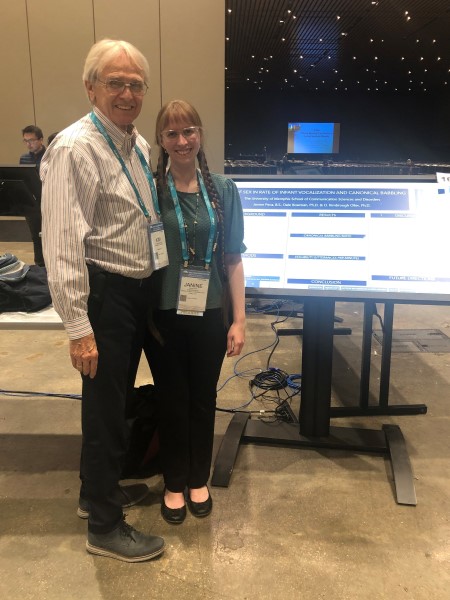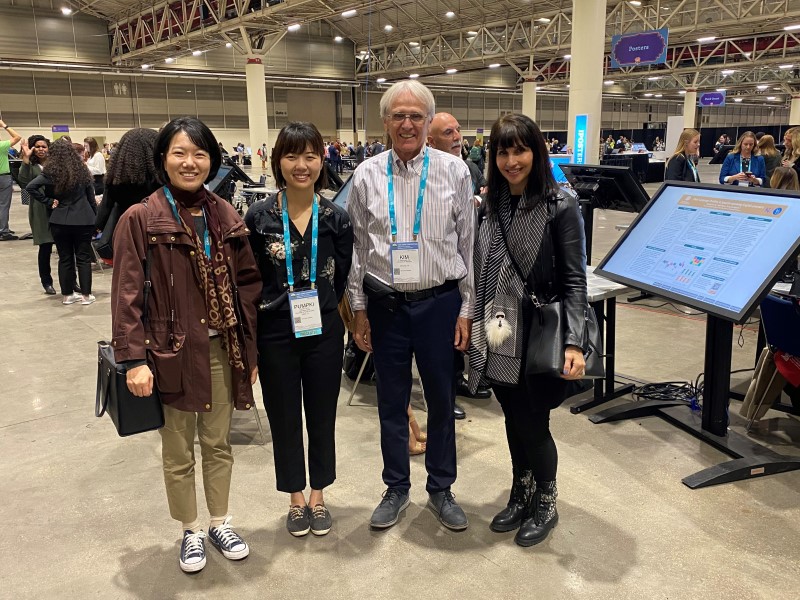School of Communication Sciences and Disorders
A Retrospective on Dr. Kim Oller's Research
Dr. Kimbrough Oller and mathematician Dr. Irena Lasiecka were elected to the 2022 class of Fellows of The American Association for the Advancement of Science (AAAS). The most prominent American scientific association, AAAS recognizes scientists from a broad scope of disciplines. Dr. Oller and Dr. Lasiecka are the first UofM researchers to receive this honor. Dr. Oller was recognized in Linguistics & Language Science for advancing the understanding of the origins of language and speech development in typical, atypical, and multilingual populations. Dr. Oller’s research integrates diverse methods and disciplines--including CSD and theoretical biology--to explore what is unique about the way human language develops and the ways that humans use language.
Language and science have been constants throughout Dr. Oller’s academic career, starting with his BA in Romance Languages. “I thought I was just going to be a polyglot, at one point,” Dr. Oller shared. Although he enjoyed learning second languages, his love for science drew him to study language scientifically in his doctoral program in Psycholinguistics. His interest in science is evident, extending beyond formal research. "I'm very much more inclined to read and study and reread things that are about science than virtually anything else,” Dr. Oller said. “To the extent that I read fiction, a good bit of it is science fiction.”
A deep curiosity about humanity and how the world works has shaped Dr. Oller’s career. “As I thought about an academic career, I think what I imagined as being the primary worthwhile goal would be to simply understand what makes us human... How are we so different from other animals?” Dr. Oller said. “Language of course, is a pinnacle expression of that difference.”


In his PhD program, Dr. Oller studied speech acoustics, comparing the rhythm of speech across languages. After he completed his PhD in 1971, he entered the field of speech and hearing sciences as a post-doc at the University of Washington. He served as the primary phonologist on a team researching the vocal development of hearing-impaired infants. “I walked into that at age 25 and I had no idea where to start,” Dr. Oller explained. “I hadn’t any experience at all working with babies.” Once he started looking at the literature on vocal development, however, he realized that it was underdeveloped and did not match his observations of infants in the lab. “The seeds of this viewpoint about what makes us unique began to be developed as soon as I started looking at the human infant and realizing that they were doing things with vocalization that were surprising and undescribed.” Two other researchers, Rachel Elizabeth (Betty) Stark and Marsha Zlatin-Laufer, were developing similar ideas about infant vocal development around the same time, and the three met to share their findings. Their early work, along with Dr. Oller’s ongoing research, helped to shape current understanding of infant vocal development.
“Among the most important observations was the idea of what Betty called vocal play,” Dr. Oller said. Human infants, unlike other animals, “play” with and explore their voice, vocalizing for no immediate social purpose. “It’s a very rare thing for animals to produce sounds that don’t have immediate here and now functions,” Dr. Oller explained. Through analyzing all-day recordings of infants, Dr. Oller and his collaborators discovered that about 90% of the speech-like sounds produced by human infants are not directed at anyone. In conducting extensive longitudinal studies of infant vocalizations across several populations--including hearing-impairment, autism, bilingualism, and most recently, tuberous sclerosis complex--, Dr. Oller and his collaborators have shown that vocal exploration is well-established across all infants. The only exception is children with insufficient respiratory support or an insufficient larynx.
Seeking an evolutionary explanation for this unique human tendency to vocalize, Dr. Oller has partnered extensively with scientists in the field of biology. “I'm a speech and hearing person at one level, but at a much broader level I have become sort of a theoretical biologist,” Dr. Oller said. Dr. Oller and colleagues, including Dr. Ulrike Griebel of the University of Memphis, developed the fitness signaling theory, which suggests that human infants vocalizations signal to potential caregivers that the infant is healthy. “It offers what biologists would call an ultimate perspective on why we vocalize and why we have the capacity to develop language,” Dr. Oller explained.
The honor from AAAS affirms that Dr. Oller is succeeding in the goal that has motivated him since the beginning of his career: understanding what makes us human. Receiving recognition is encouraging as a researcher, Dr. Oller explained, because it means at least someone else thinks your work is worthwhile. “Success is really that you make a contribution that has lasting value in terms of developing an awareness of some truth and developing a perspective on it that’s useful,” Dr. Oller said. “The genuine search for truth is the key issue. Science is the pursuit of truth."
